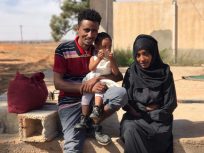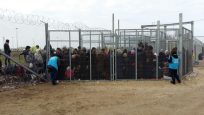Architect helps Syrian trio build new lives in Sweden
Monday 5, September 2016
MALMÖ, Sweden – Architect Lars Asklund, who is affectionetly known as Jim, was deeply moved by the images on television of thousands of people arriving in Sweden in 2015. He wanted to help, but did not know how.
First, he went to the migration authorities in Malmö and told them he had two empty guest rooms. Nothing happened. Then he went to a nearby asylum centre where new arrivals were being processed and housed temporarily.
He approached a young man who had a small child, but was reluctant to take on the responsibility of housing a child. So he turned to the man standing behind, Waleed Lababidi, who had been translating.
“I asked him three questions: ‘Are you married?’ He said yes. ‘Do you have kids?’ He said no. I looked him straight in the eye and asked: ‘Are you a fundamentalist?’ He said no. I told him ‘Okay, I have a good proposal for you’.”
Waleed, 29, and his wife, Farah Hilal, 25, are refugees from Syria. They and Farah’s 22-year-old brother, Milad Hilal, now share Lars’s apartment.
Waleed remembers their first night at Lars’s place.
“We were exhausted,” he said. “We had dinner and didn’t talk much. He gave us a set of keys. The minute we closed the door to our room we were so relieved – Farah started crying from joy. We could finally settle some place.”
“It’s fantastic – I have new friends and I really like them.”
A month after they moved in, Lars invited Farah’s brother, Milad, to join them for Christmas. The four had an enjoyable time and got along well. Milad was still living at the asylum centre. When Lars drove him back there afterwards, he saw the “depressing” conditions at the centre, where 580 young men were crammed in.
“I just couldn’t leave him there. I told him to pack his belongings,” Lars said. “He was coming back with me.”
Farah, Milad and Waleed were displaced inside Syria long before they left the country. They fled their home in 2012, first staying in hotels, or with relatives or friends. Eventually, during a family dinner, a missile landed across the street, burning everything, and they decided they had to go. “The minute we saw daylight we packed whatever we could and ran,” Waleed said.
The four always have breakfast together, and sometimes dinner. Waleed, Farah, Milad and some other refugees gather each week at Lars’s big kitchen table for a two-hour Swedish language class. One of the neighbors, a retired teacher, also provides an additional hour of language instruction per week. Another friend takes them grocery shopping.
“For me it’s fun,” said Lars. “It’s fantastic – I have new friends and I really like them.”
“They help me out a lot. Sometimes they walk the dog. They started to clean more and more, and so my cleaning lady got upset and left.”
Lars is constantly throwing parties to try to introduce them to people in the community and help them network.
“He cares so much,” said Milad. “He studies with me, even when he comes late at night. He is always discussing with his friends how to help us with our career. We are so lucky to have met him.”
This story is part of a series entitled No Stranger Place, which was developed and photographed by Aubrey Wade in partnership with UNHCR, profiling refugees and their hosts across Europe. One year on from the drowning of three-year-old Syrian refugee Alan Kurdi, thousands of people have come together to bridge cultural divides and language barriers, embracing compassion, hope and humanity – even as some European governments continue to build obstacles. Their generosity is an example to the world.
Page 1 of 2
-

Research on Integration for People of Concern in Hungary
26 Feb 2019Assessing the challenges, opportunities and
obstacles refugees face when integrating in Hungary. -

Under pressure, university closes its doors to refugee students
24 Oct 2018With the suspension of the Central European University’s Open Learning Initiative, refugees have lost a unique opportunity to continue their studies and contribute to the region.
-

Vulnerable refugees evacuated out of Libya land in Timisoara
18 Oct 2018Amidst an increasingly volatile security situation in Tripoli, UNHCR, the UN Refugee Agency successfully evacuated 85 people, refugees from Syria, Sudan and Eritrea, to Timisoara, Romania. Here they will spend a few weeks at UNHCR’s Emergency Transit Facility before flying onwards to Norway.
-

Polish and Chechen children mingle in cheerful village school
18 Oct 2018It is the first day of the school year and head teacher Barbara Protasiewicz is welcoming the children. She is not expecting flowers but, to her surprise, three Chechen girls hand her roses.
-

Pakistani refugee overcomes injury and trauma on road to Europe
11 Oct 2018After suffering a horrific accident, 18-year-old Muhammad is on the road to recovery and has the chance of a fresh start in Croatia.
-

Refugee children find voice in Romania’s inclusive choirs
9 May 2018A project to bring children together through song is extended to include refugees.
-

Hungary: UNHCR dismayed over further border restrictions and draft law targeting NGOs working with asylum-seekers and refugees
16 Feb 2018UNHCR calls on the Government to withdraw a proposed bill that would deprive refugees of vital support from NGOs and civil society.
-

UNHCR Calls on Bulgaria To Ensure Access for Asylum-Seekers
2 Feb 2018One of the UN Refugee Agency’s top officials today expressed appreciation to the Bulgarian authorities for their efforts to improve reception conditions since 2014 and called on Bulgaria to ensure that people forced to flee war and persecution can enter the country, have their asylum claims processed fairly, and find the protection they need.
-

UNHCR urges suspension of transfers of asylum-seekers to Hungary under Dublin
12 Apr 2017UNHCR, the UN Refugee Agency, today called for a temporary suspension of all transfers of asylum-seekers to Hungary from other European States under the Dublin Regulation.
-

Special Envoy Angelina Jolie renews UNHCR contract, says ‘I’m with you for life’
15 Mar 2017During a visit to the UN Refugee Agency’s headquarters in Geneva, Jolie urged staff to step forward and ‘say who we are and who we fight for and work even harder.’
